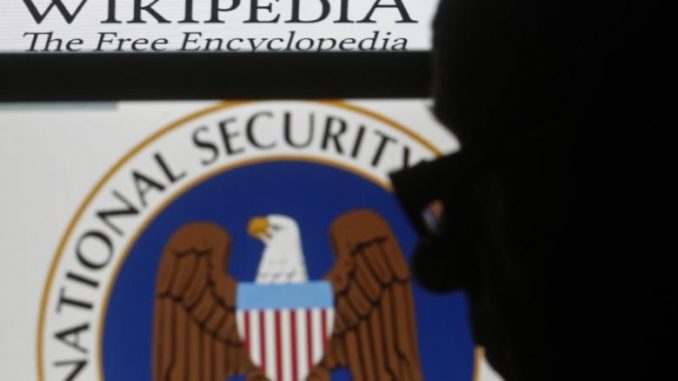
Wikipedia is suing the U.S. National Security Agency (NSA) for their illegal mass surveillance of the general public, claiming the Obama administration unconstitutionally invaded people’s privacy rights.
A federal appeals court on Thursday revived the lawsuit, agreeing by a 3-0 vote that the Wikimedia Foundation could challenge the government’s “Upstream” surveillance program.

BYPASS THE CENSORS
Sign up to get unfiltered news delivered straight to your inbox.
You can unsubscribe any time. By subscribing you agree to our Terms of Use
Latest Video
Yahoo News reports: The decision could make it easier for people to learn whether authorities have spied on them through Upstream, which involves bulk searches of international communications within the internet’s “backbone” of cables, switches and routers.
Upstream’s existence was revealed in leaks by former NSA contractor Edward Snowden in 2013.
Lawyers for the Wikipedia publisher and eight other plaintiffs including Amnesty International USA and Human Rights Watch, with more than 1 trillion international communications annually, argued the surveillance violated their rights to privacy, free expression and association.
The U.S. Department of Justice countered that the Foreign Intelligence Surveillance Act has authorized Upstream and its review of communications between Americans and foreign “targets.”
In October 2015, U.S. District Judge T.S. Ellis III in Baltimore dismissed the lawsuit, finding a lack of evidence that the NSA, headquartered in Maryland, was conducting surveillance “at full throttle.”
Writing for the appeals court panel, however, Circuit Judge Albert Diaz found “nothing speculative” about the Wikimedia Foundation’s claims.
Diaz said the NSA interception and copying of communications showed “an invasion of a legally protected interest – the Fourth Amendment right to be free from unreasonable searches and seizures.”
The Wikipedia publisher can also pursue its First Amendment claim because it had “self-censored” some communications in response to the Upstream surveillance, Diaz said.
By a 2-1 vote, the panel also ruled the plaintiffs lacked standing to challenge the NSA’s alleged “dragnet” to intercept “substantially all” text-based communications to and from the United States while conducting Upstream surveillance.
The Justice Department did not immediately respond to a request for comment.
Patrick Toomey, an American Civil Liberties Union lawyer representing the plaintiffs, said the ruling means Upstream “will finally face badly needed scrutiny” in the courts.
“This is an important victory for the rule of law,” he said in a statement. “Our government shouldn’t be searching the private communications of innocent people in bulk.”
The case is Wikimedia Foundation et al v National Security Agency et al, 4th U.S. Circuit Court of Appeals, No. 15-2560.


